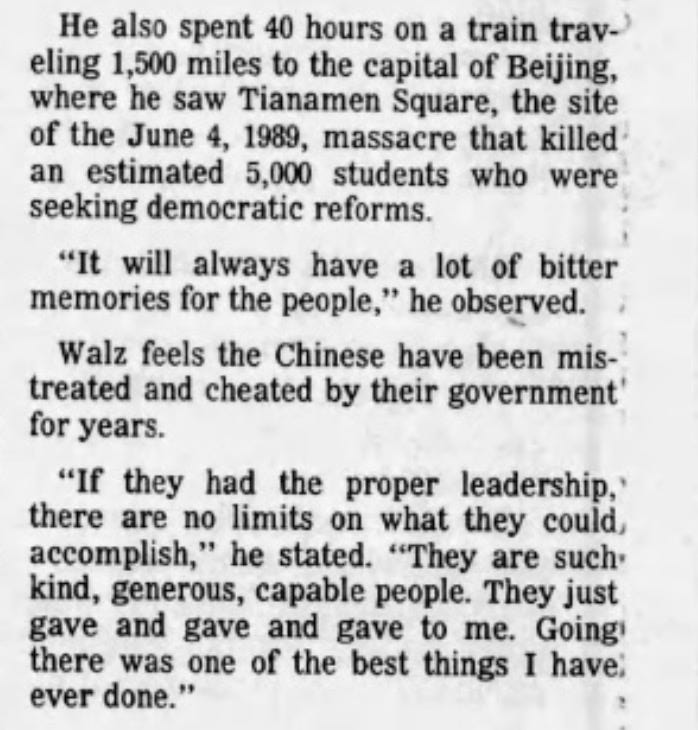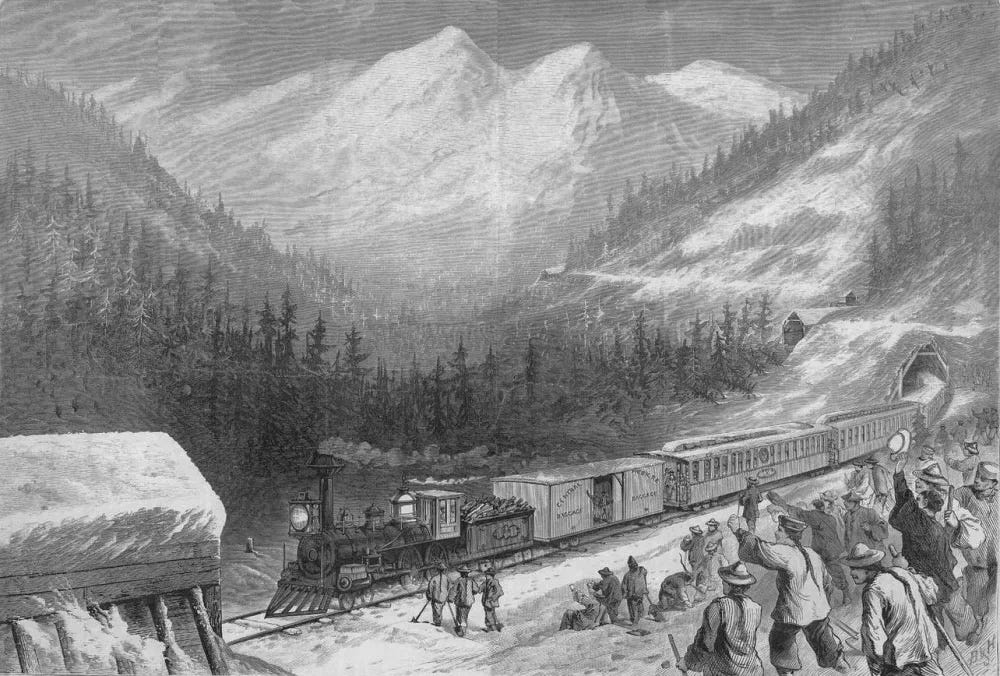Tim Walz on China
Featuring his 6/4 Wedding Anniversary and the Dalai Lama
Kamala Harris just selected Minnesota’s governor Tim Walz as her running mate. He has a long history of engagement with China dating back to a year he spent teaching in Guangdong in 1989. Here’s our first reporter’s notebook on the topic.

VP Walz — A Sinophile Deeply Concerned with Human Rights
After graduating high school in 1982, he worked in manufacturing and joined the National Guard. He graduated from Chadron State College in 1989 and promptly moved to China. There, he taught high school classes on English and American history through the WorldTeach program.
Specifically, he taught at the Foshan No. 1 High School directly north of Hong Kong. It’s an elite Guangdong school with a hundred-year history and a track record of sending students to top universities. It’s most remarkable for its Tibet Department founded in 1995. In 2002, it started a program taking boarding students from Tibet, and the school proudly boasts about how a number of those students became Tsinghua and PKU undergrads. Walz visited Tibet before returning to the USA, so perhaps there was already a Foshan-Tibet connection back in 1989.
Why did Walz go to China? From a 2007 interview with the Hill:
“China was coming, and that’s the reason that I went,” said Walz, who was then a rare Westerner in a society only starting to open up. His Chinese students nicknamed him “Fields of China.”
“Because your kindness was as big as the fields of China,” his students explained. They also called him “big-nosed one” and “foreign devil,” though neither, he believes, was uttered with malice. Upon returning stateside, Walz and his wife set up a company, Educational Travel Adventures, to coordinate summer trips to China for American high-school students.
Walz and his wife honeymooned in China after getting married on the 5th anniversary of Tiananmen Square. Why? “He wanted to have a date he’ll always remember,” said his wife.

During his years as a teacher in the US, he ran a summer exchange program with his wife, bringing dozens of students to China every summer for two decades.
If you were part of one of these trips or have any other Tim Walz China stories to share on or off the record, please respond to this email, we’d love to run them!
As a representative, Walz served on the Congressional-Executive Commission on China. This body, unlike other Congressional China-oriented initiatives, is exclusively focused on human rights. He often recounted his memories in China during congressional testimonies.
From his remarks on Tibet in 2016:
As you may know, I had the opportunity to be one of the first groups of Americans to travel to China and teach Chinese high school students in 1989. During that trip, I also traveled to Tibet in 1990 and, most recently, I have returned as a member of the Congressional Delegation visiting China and Tibet. The boosted economic growth, higher household incomes, and constructed railway projects have facilitated the rapid modernization of the Tibet Autonomous Region. However, we need to continue to have constructive dialogues with China to ensure the preservation of traditional Tibetan culture and Tibet's fragile ecology.
…
The U.S. was founded on the ideas of universal freedom, and I believe that we must continue to urge the Chinese government to provide less regulated religious freedom to the Tibetans.
…
I will continue to support attempts to have productive dialogues with the Chinese government concerning the future of Tibet. Improvements in the quality of life, access to clean water, and access to health care services in Tibet must also include efforts to preserve the Tibetan way of life.
From the Commission’s hearing on the detention of Chinese civil rights activist Chen Guangcheng 陈光诚:
I taught high school in Foshan, Guangdong province. I know China has announced notable reforms and advancement in recent years. I applaud the accomplishments of the Chinese people and recognize that some in the Chinese Government advocate for greater rule of law.
But we cannot believe China is serious about the rule of law while Chen Guangcheng and his family are being forcefully held and abused.
We cannot believe China is serious about human rights while it flagrantly violates its own laws and international human rights commitments.
…
Finally, let us remind our friends in China that all great nations achieve more through open dialogue and free flow of information than through forced silence.
Walz co-sponsored a slew of resolutions expressing opinions about China’s human rights record. These include:
A resolution in support of releasing activist Liu Xiaobo 刘晓波 from prison, and another resolution after Liu’s death honoring his life and legacy;
A resolution for the 20th anniversary of the Tiananmen Square massacre, which called for an investigation into the treatment of imprisoned protesters;
A resolution expressing support for the Chinese human rights activists Huang Qi 黃琦 and Tan Zuoren 谭作人, who were criminally prosecuted for “slandering” the Chinese government’s response to the 2008 earthquake in Sichuan;
A resolution expressing concern about reports of state-sanctioned organ harvesting from prisoners in China.
Other relevant bills include one that would award a Congressional Gold Medal to Chinese-American WWII veterans, a bill to ease restrictions on highly skilled immigration from the PRC, and a resolution to dedicate a postage stamp to Chinese railroad workers.
Military Spending and National Security
Walz is a veteran of the Army National Guard and served abroad in support of Operation Enduring Freedom. He is the highest-ranking enlisted soldier ever to serve in Congress.
He joined with Republicans to oppose a drawdown of military spending, specifically citing China as a concern. From his speech before Congress in 2016:
Since the time this plan was written and put into effect: [we have seen] the rise of ISIS, China has built a new island in the South China Sea and is landing aircraft on it now, and a belligerent Russia.
But more than that, we have seen the use of the military force as a deterrent, not just to aggression. We have seen it as a peaceful use, whether it be in Haiti to respond to natural disasters or to respond to Ebola in West Africa. The best trained, the most efficient and the most ready force to be able to use our diplomacy and our humanitarian assets is this land force.
…
So I think, for many of us, this is not only a national security issue, it is a smart fiscal issue. We have paid dearly with treasure and blood to have this force. I can tell you, if the force shrinks too much — and we have seen this happen — the rotations happen very quickly.
We couldn’t immediately find a video of him speaking a full sentence of Chinese (he doesn’t claim to be able to speak much) but he has consistently wished his constituents a happy Chinese New Year. I’d give his 恭喜发财 a solid 7/10.
More to come on Walz! Please share your Walz China stories (which you can share on or off the record) by responding to this email.
Oh, and he hung with Joshua Wong.




His 恭喜发财 is said in Cantonese and is a solid 10/10 at that
Fascinating report. Thank you!